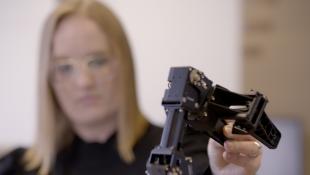EPSRC and MoD Centre for Doctoral Training in Sensing, Processing, and AI for Defence and Security (SPADS)
The SPADS doctoral programme will train the next generation of highly professional defence scientists, including engineers, computer scientists, and mathematicians, capable of leading developments in cutting-edge and generation-after-next technologies in information and communication technology that are poised to transform not only the world of defence & security, but also the broader civilian society.
This will be addressed by underpinning interconnected technology and sensing modalities working across multiple sensing domains, leveraging advances in autonomy, embedded systems, and AI across both software/algorithms and hardware.
SPADS graduates will leave with substantial knowledge and experience:
- a solid understanding of fundamental concepts from hardware and sensing and processing to software (provided via an intensive taught course);
- cutting-edge knowledge in a specialisation of their choosing;
- practical experience of research;
- a solid understanding of the ethics of research & development;
- invaluable contacts with UK industry; and
- connections with an entire cohort of future leaders in research & development.
Note that a SPADS funded place has the following advantages beyond typical Doctoral Training Programme scholarships that might be appealing to students:
- An enhanced annual stipend of £21,400 tax-free;
- A research training and support grant (RTSG) over the 4-year PhD, which is a substantial uplift on most PhD scholarships.
- Funding for access to key facilities, such as the Edinburgh International Data Facility, the National Robotarium, and the Scottish Microelectronics Centre.
- Access to a wide variety of cohort training events, from summer schools to specialised theme meetings, innovation & commercialisation sandpits, and knowledge transfer meetings with Dstl.
- Finally, access to our industry partners who will provide numerous opportunities for placements, data access, and career development.
Further Information:
Please visit the SPADS CDT website for further information.
Principal Supervisor:
Professor James Hopgood (UoE)
Assistant Supervisor:
Dr Yoann Altmann (HWU), Dr Alexander Serb (UoE)
Eligibility:
Visit the SPADS CDT website for further information on Eligibility.
Funding:
Visit the SPADS CDT website for further information on Funding.



